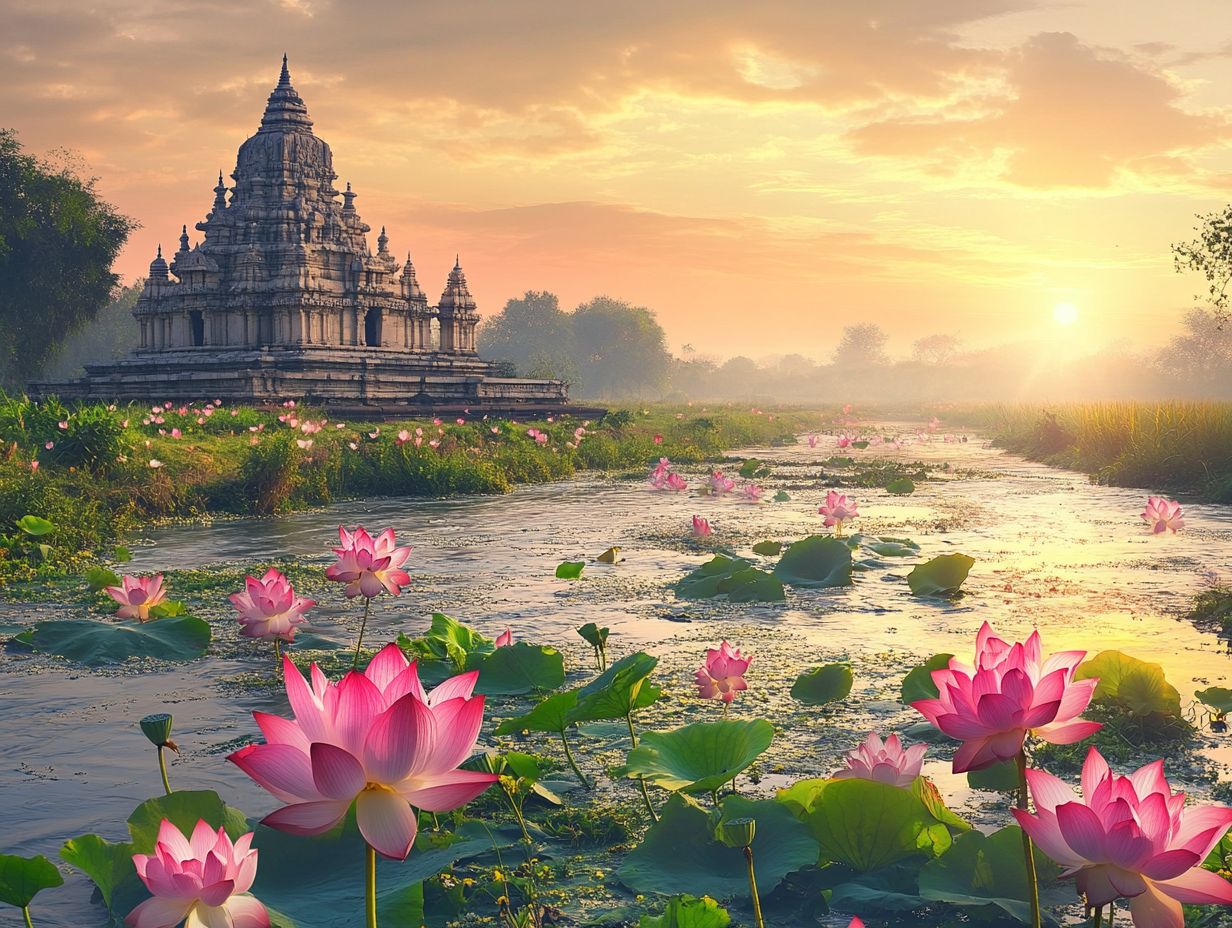What is Reincarnation in Hinduism?
Reincarnation stands as a captivating concept intricately woven into the fabric of Hinduism, symbolizing the profound cycle of life, death, and rebirth as depicted in sacred texts like the Vedas and Upanishads. This exploration delves into the multifaceted beliefs that surround reincarnation, examining its purpose, the pivotal role of karma, and the spiritual journey that unfolds after death.
The discussion further highlights the distinctions between samsara and moksha, as well as the influence of Hindu deities on this intricate belief system. It also addresses the everyday implications of these philosophies, tackling criticisms and ethical questions to provide a rich and nuanced understanding of reincarnation within Hindu thought, incorporating spiritual practices like meditation and asceticism.
This inquiry invites readers to uncover the elaborate tapestry of this intriguing philosophy and its metaphysical concepts.
What Is Reincarnation in Hinduism?

Reincarnation is a profound concept intricately woven into the fabric of Hinduism, embodying the belief in a continuous cycle of rebirth and transmigration. Within this framework, the atman, or soul, undergoes transformation, taking on a new body after death.
This cycle persists until one achieves moksha, or spiritual liberation, marking the conclusion of reincarnation and a reunion with the divine essence of Brahman.
The philosophy of reincarnation asserts that one s actions in previous lives, influenced by the law of karma and divine justice, significantly shape their current existence, guiding the atman on its spiritual journey toward enlightenment and personal growth.
What Is the Concept of Reincarnation in Hinduism?
In Hinduism, the concept of reincarnation is intricately tied to the belief that the soul, or atman, is eternal and undergoes a perpetual cycle of birth, death, and rebirth, referred to as samsara. This cycle is profoundly influenced by one’s karma, which encompasses all moral actions throughout an individual’s lifetime and dictates the conditions of future existences.
As individuals navigate their lives, each decision and action contributes to their karma, weaving a complex tapestry of choices that shapes their future incarnations. The overarching principle of dharma, or righteous duty, is fundamental to this process, guiding individuals to act ethically and fulfill their responsibilities, thereby balancing the karmic cycle.
Adhering to dharma is believed not only to enhance one’s karma but also to facilitate spiritual growth and ultimately offer liberation from the cycle of samsara. The journey of the atman through multiple lives reflects a profound cosmic law in which spiritual evolution is attained through the lessons learned, the balancing of desires, and the pursuit of enlightenment, as depicted in various Hindu scriptures.
What Are the Beliefs about Reincarnation in Hinduism?
Hindu beliefs regarding reincarnation highlight the profound concept that the atman undergoes a series of lifetimes, facilitating spiritual evolution and personal transformation across diverse forms and experiences, resonating with the ancient texts and sacred rituals.
The soul’s journey is intricately guided by the principles of karma, which underscores the notion that moral actions in one life have a direct impact on future reincarnations. This interconnection profoundly shapes an individual’s destiny, emphasizing the importance of ethical conduct in the continuous cycle of existence.
What Is the Purpose of Reincarnation in Hinduism?
In Hinduism, the purpose of reincarnation is to facilitate spiritual liberation, or moksha, by enabling the lessons learned in each life to contribute to the soul s evolution and understanding of dharma. Each reincarnation presents unique experiences that enrich the individual s journey toward enlightenment, underscoring the paramount importance of personal growth and ethical living.
This cyclical process transcends mere existence; it represents an opportunity to refine oneself and cultivate virtues such as compassion, honesty, and humility. By engaging in ethical conduct throughout their multiple lifetimes, individuals can gradually shed the layers of ignorance and attachment that tether them to the material world and physical existence.
Living a life aligned with one s higher self becomes essential, as it significantly influences the soul s trajectory toward moksha. Through the accumulation of wisdom and diligent practice of karma, individuals can ultimately transcend the cycle of rebirth, achieving a profound state of unity with the divine.
What Is the Role of Karma in Reincarnation?
Karma holds a central position in the reincarnation process within Hinduism, embodying the principle that every moral action significantly influences an individual s fate and destiny in subsequent lives. The cumulative effect of both positive and negative deeds shapes the conditions of the next incarnation, guiding the atman through its unique spiritual journey and reincarnation cycle.
This intricate web of cause and effect highlights the paramount importance of ethical conduct, with individuals regarded as the architects of their own futures. By adhering to dharma, or righteous duty, one can cultivate good karma, thereby enhancing their own existence as well as positively impacting the lives of others, aligning with the divine law.
The philosophical implications of this belief extend beyond mere actions; they foster a deeper understanding of the interconnectedness of life. This perspective promotes the idea that each soul’s journey is intricately linked to the collective experience of the universe, as outlined in spiritual teachings and Hindu philosophy.
As a result, the pursuit of wisdom and compassion emerges as an essential endeavor, shaping not only the present but also sculpting the tapestry of future lives, ultimately enriching one s spiritual evolution and understanding of the ultimate reality.
How Does Reincarnation Work in Hinduism?
Reincarnation in Hinduism represents a profound and intricate process that unfolds within the grand tapestry of life. Here, the atman essentially the soul undergoes a transformative journey, transitioning through myriad forms following death, as depicted in reincarnation stories and Hindu cosmology.
This cycle is meticulously guided by the principles of karma, which serve as a moral compass shaped by an individual’s spiritual endeavors throughout their lifetime. Consequently, these actions intricately influence the soul’s trajectory in the afterlife, ultimately determining the character and essence of future incarnations.
What Happens After Death in Hinduism?

In Hinduism, following death, the soul embarks on a profound transformative journey shaped by its past actions as it navigates the afterlife, ultimately leading to the reincarnation process. The beliefs surrounding this transitional phase underscore the significance of the soul’s experiences and the karmic consequences that dictate its subsequent form of existence.
As the journey commences, the transition encompasses several stages, including an encounter with Yama, the god of death, who conducts a thorough assessment of the individual’s life. This evaluation is critical, as it determines the soul’s next steps in its journey. Depending on its karmic balance, the soul may ascend to elevated realms of existence or descend into less favorable circumstances, reflecting the divine purpose.
Cultural rituals, such as cremation and the offering of food and prayers collectively known as Shraddha serve a pivotal role in supporting the departed on this voyage. These practices not only honor the deceased but also facilitate the purification of the soul, effectively preparing it for its destined rebirth, a practice rooted in ancestral beliefs.
What Determines the Next Reincarnation in Hinduism?
In Hinduism, the next reincarnation is intricately shaped by the theory of karma, which posits that an individual s moral actions and ethical conduct throughout their lifetime directly influence their future births. This process serves as a reflection of the soul s spiritual evolution, charting its course toward the attainment of moksha and ultimately determining its destiny, a key element of spiritual teachings.
The dynamic interplay of karma, ethical behavior, and spiritual awareness is pivotal in guiding the soul through its numerous lifetimes. Each action reverberates in accordance with the universal law of cause and effect; positive actions nurture spiritual growth, while negative deeds risk stagnation or regression, influencing the soul’s journey.
An individual s capacity for self-awareness and comprehension of their moral responsibilities amplifies their potential to transcend the cycle of reincarnation. As they navigate the myriad challenges of life, their conscious choices significantly impact their karmic trajectory, ultimately determining the nature of their subsequent existence and resonating with the overarching themes of spiritual development and reincarnation myths.
What Are the Different Types of Reincarnation in Hinduism?
In Hinduism, various forms of reincarnation illuminate the soul’s journey through samsara, each underscoring distinct beliefs and pathways toward spiritual liberation, or moksha, as detailed in sacred texts and spiritual frameworks.
These diverse concepts reveal the intricate and multifaceted nature of existence, showcasing the myriad forms of life that the atman may inhabit throughout its cyclical journey of rebirth, highlighting the philosophical inquiries of Hindu thought.
What Is the Difference between Samsara and Moksha in Hinduism?
Samsara and moksha embody two foundational concepts within Hinduism. Samsara denotes the perpetual cycle of rebirth and existence, while moksha signifies the ultimate spiritual liberation from this relentless cycle. Grasping the distinction between these two notions is crucial for comprehending the broader philosophical interpretations of life, death, and the soul s journey within the cosmic order.
The relationship between samsara and moksha can be likened to a dance of spiritual evolution, where each rebirth presents the soul with opportunities to learn, grow, and ultimately transcend material attachments. In this cyclical existence, individuals encounter the repercussions of their actions, known as karma, which acts as a guiding force in shaping future incarnations.
The supreme aspiration is to attain moksha, which transcends mere escape from the physical realm; it represents a profound realization of one’s true self and unity with the divine.
This process of realization is vital for understanding how the cycle of samsara fosters deeper insights into the nature of existence and the quest for spiritual fulfillment.
What Is the Role of Gods and Goddesses in Reincarnation?
In Hinduism, gods and goddesses hold a pivotal position in the beliefs surrounding reincarnation, acting as guardians and guides on the spiritual journey of the atman. Their divine purpose is to aid souls in navigating the intricacies of existence, bestowing blessings that significantly influence the cycle of rebirth.
Each deity embodies specific life lessons and ethical principles that enrich this sacred journey. For instance, Lord Krishna, as an incarnation of Vishnu, symbolizes dharma and righteousness, inspiring souls to live in harmony with universal laws. Conversely, Yama, the god of death, oversees the delicate transition between life and the afterlife, reinforcing the notion that one’s actions during life directly affect their future incarnations.
The symbolism inherent in these deities illustrates the profound interconnectedness of life, death, and the ongoing path of spiritual evolution, underscoring the vital importance of moral conduct and the relentless pursuit of truth in one’s soul journey.
What Are the Benefits of Believing in Reincarnation in Hinduism?
Embracing the concept of reincarnation provides a wealth of benefits within Hinduism, facilitating personal transformation, enhancing spiritual awareness, and encouraging ethical principles that inform moral conduct.
This profound understanding of the cycle of rebirth give the power tos individuals to navigate life’s challenges with a more expansive perspective on existence and the afterlife.
How Does Reincarnation Impact Daily Life in Hinduism?

The impact of reincarnation on daily life in Hinduism is profound, shaping individuals’ actions, decisions, and interactions through a nuanced understanding of karma and the consequences of moral conduct. This awareness inspires followers to engage in spiritual practices that promote ethical behavior and personal growth.
By internalizing the belief that one’s actions in this life will influence future existences, practitioners often make deliberate choices that embody compassion, honesty, and humility. Daily rituals, such as prayer and meditation, act as reminders of their karmic responsibilities, encouraging adherents to act with integrity. This perspective cultivates deep interpersonal relationships, as individuals strive to recognize the divine in one another, fostering a sense of community and mutual support.
The cycle of rebirth compels Hindus to cultivate virtues, thus reinforcing a morality that resonates throughout their social interactions and ultimately creating a harmonious environment grounded in shared ethical principles.
What Are the Spiritual Lessons of Reincarnation in Hinduism?
The spiritual lessons derived from reincarnation in Hinduism underscore the essential themes of personal growth, the pursuit of enlightenment, and the steadfast adherence to dharma throughout one s life. Each reincarnation is viewed as a unique opportunity for learning and evolution, inviting individuals to explore their potential.
As individuals traverse the landscape of various lifetimes, they are urged to reflect on past experiences and the choices they have made, acknowledging that every action is accompanied by karmic consequences. This cyclical journey serves to reinforce the importance of making deliberate decisions that align with one s dharma, thereby guiding them toward elevated states of awareness and spiritual development.
By emphasizing the necessity for personal transformation, these lessons foster the growth of compassion, wisdom, and self-realization, drawing individuals closer to enlightenment and the liberation from the cycle of birth and rebirth. Ultimately, the insights gained through reincarnation offer a profound understanding of one s purpose and their intrinsic connection to the universe.
What Are the Criticisms of Reincarnation in Hinduism?
Critiques of reincarnation within Hinduism emerge from a diverse array of philosophical interpretations and ethical considerations that question its validity and practical significance. These challenges frequently originate from varying cultural perspectives and modern viewpoints on existence, the afterlife, and moral responsibility.
Is Reincarnation Scientifically Proven?
The question of whether reincarnation is scientifically proven remains a contentious topic, as metaphysical concepts often elude empirical validation. While anecdotal evidence and personal testimonies do abound, they challenge the boundaries of scientific inquiry and spark debates regarding the nature of consciousness and existence.
Proponents of reincarnation frequently reference various cases of children who vividly recall memories of past lives, proposing a continuity of consciousness that transcends physical death. These compelling accounts invite a more profound exploration of the intersections where spirituality converges with science, urging researchers to consider the implications of such extraordinary claims.
Conversely, skeptics contend that these experiences can be elucidated through psychological phenomena, cultural influences, or even the brain s innate tendency to fabricate narratives.
This ongoing discourse not only emphasizes the complexities surrounding empirical evidence but also reflects a deep-seated yearning to comprehend the human experience beyond the tangible confines of reality.
What Are the Ethical Implications of Reincarnation in Hinduism?
The ethical implications of reincarnation in Hinduism hold considerable significance, as the theory of karma suggests that moral actions directly influence future rebirths and the spiritual identity of the atman. This understanding cultivates a profound sense of personal responsibility and accountability for one s actions throughout life.
As individuals navigate their moral landscapes, the belief in karma serves as a guiding principle, shaping their decisions and interactions with others. This interconnectedness underscores how one’s ethical choices can create ripples that affect the lives of others, reinforcing bonds and fostering a sense of community.
These foundational principles emphasize the importance of compassion and empathy, urging individuals to contemplate the broader impact of their actions. By promoting a cycle of positive deeds and encouraging self-reflection, such beliefs not only enrich personal spiritual journeys but also nurture healthier relationships, creating an environment where ethical behavior transcends individual pursuits and becomes a collective responsibility.
Frequently Asked Questions
What is Reincarnation in Hinduism?

Reincarnation in Hinduism is the belief that the soul, after death, is reborn into a new body. It is a fundamental part of the Hindu religion and is based on the concept of karma.
How does reincarnation work in Hinduism?
According to Hinduism, the soul is eternal and goes through a cycle of birth and death. After death, the soul is reborn into a new body based on its past actions and karma.
What is the purpose of reincarnation in Hinduism?
The ultimate goal of reincarnation in Hinduism is to break the cycle and achieve moksha, or liberation from the cycle of birth and death. This is achieved by attaining a higher level of consciousness and merging with the divine.
Does everyone believe in reincarnation in Hinduism?
Reincarnation is a central belief in Hinduism, but not all Hindus believe in it. Some Hindus believe in an afterlife rather than reincarnation, while others reject the idea altogether.
Can a person reincarnate into any form in Hinduism?
In Hinduism, the form of reincarnation is determined by one’s karma. The soul can be reborn into any form, including humans, animals, and even plants, depending on their actions in previous lives.
How can one break the cycle of reincarnation in Hinduism?
To break the cycle of reincarnation, one must practice good deeds, lead a virtuous life, and ultimately achieve moksha through spiritual practices such as meditation and devotion to God.
